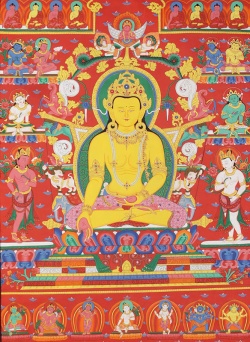Ratnasambhava - Wisdom of Equality and Abundance
Buddha Ratnasambhava (in Tibetan Rinchen Jungne) is one of the principal 5 Dhyani Buddhas in Mahayana and Vajrayana Buddhism.
Ratnasambhava represents the wisdom of equality and transforms all inner feelings of pride into vision of equality and equanimity. His name “Ratnasambhava” can be translated as “born from the jewel” or "Origin of Jewels."
The Pure Land of Ratnasambhava is in the south, called Shrimat.
In Bardo Thodol, Tibetan Book of the Dead, he is depicted in union with his female consort Mamaki and attended by the male bodhisattvas Akashagarbha and Samantabhadra and the female bodisattvas Mala and Dhupa.
Ratnasambhava is golden yellow in colour, like a midday sun.
Ratnasmabhava's wisdom is the wisdom of equality which sees that everything has the same nature, which is the nature of Emptiness.
He is seated in full lotus posture on a white moon disc which is the centre of a yellow lotus.
The lotus throne is supported on the backs of four golden yellow horses. Ratnasambhava’s body is made of golden yellow light and he is wearing richly embroidered yellow robes. His right hand is resting on his right knee with the open hand facing outwards in a gesture of supreme giving, the varada mudra.
His left hand is resting in his lap with the palm facing upwards and on the open palm Ratnasambhava holds a shining jewel, cintamani, a symbol of Bodhichitta as the highest value in Buddhism. His hair is blue/black in colour and he is smiling compassionately.
Around his head is an aura of green light and around his body is an aura of blue light. Ratnasambhava is associated with the qualities of giving, richness and abundance, expansiveness, beauty, creativity and the Wisdom of Equality.
Ratnasambhava is associated with values, wealth, abundance and providing values or generosity. Generosity is the most fundamental virtue in Buddhism.
For serious practitioners it manifests as Bodhichitta, helping to share compassion and teachings how to work with a mind.
For householders practice of generosity builds up a merit for a good future in this life and a good rebirth in next life in good circumstances where they can practice Buddhism and reach realization.
On a worldly level Ratnasambhava represents wealth. One of the main Bodhisattvas in his entourage is Zambala, the manifestation of wealth and richness. Ratnasambhava is also associated with beauty and art.
According to Bardo Thodol, Tibetan Book of the Dead, Ratnasambhava appears to us in our after-death state on a third day, after Buddha Akshobhya:
“On the third day the yellow light of the completely purified element of earth will show up.
Then from the yellow southern dimension called Shrimat the noble Ratnasambhava will manifest. His body is yellow and he holds jewel in his hands.
Together with his consort Mamaki he sits on the throne supported by horses. He is accompanied by two bodhisattvas Akashagarbha and Samantabhadra, and two bodhisattvas, Mala and Dupa.
Altogether in the space of rainbow light six images of Buddhas are shining.
The yellow light of aggregate of senses (vedana-skandha) in its pure dimension is a Wisdom of Equality - radiant, decorated with disks of rainbow light, bright and sparkling, unbearably bright to the eye, will radiate from the heart of Ratnasambhava and his consort into your heart ...”
